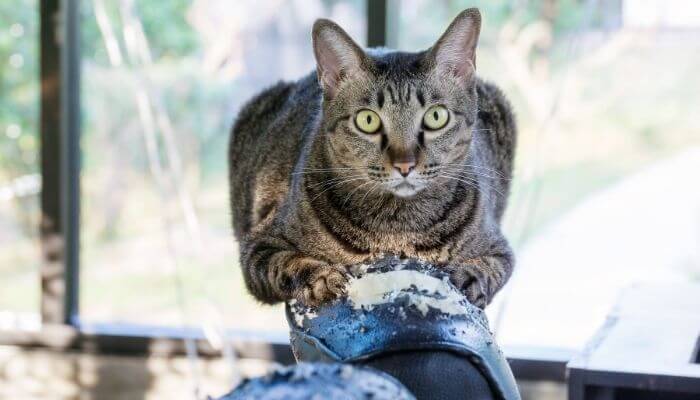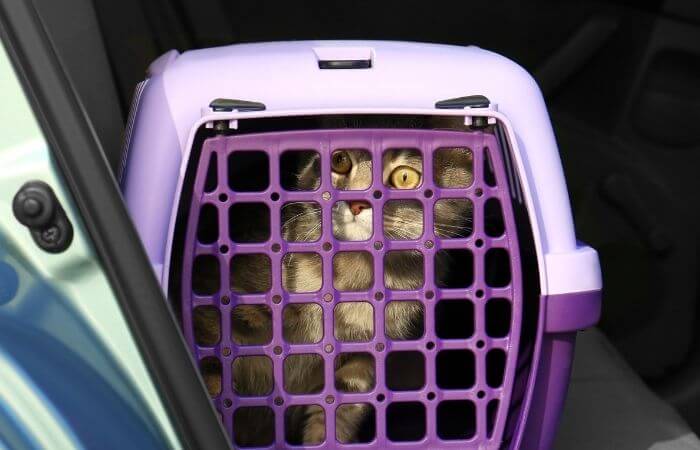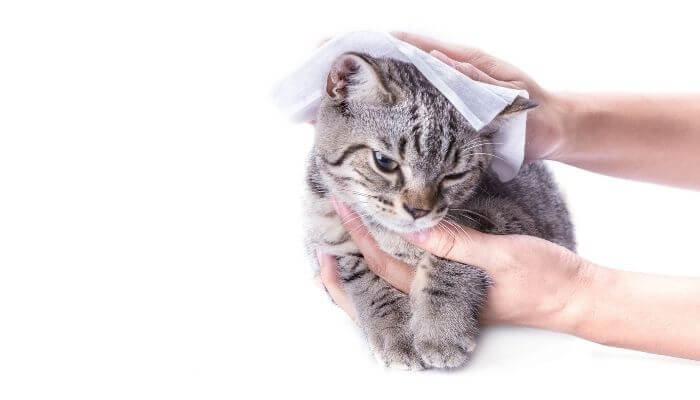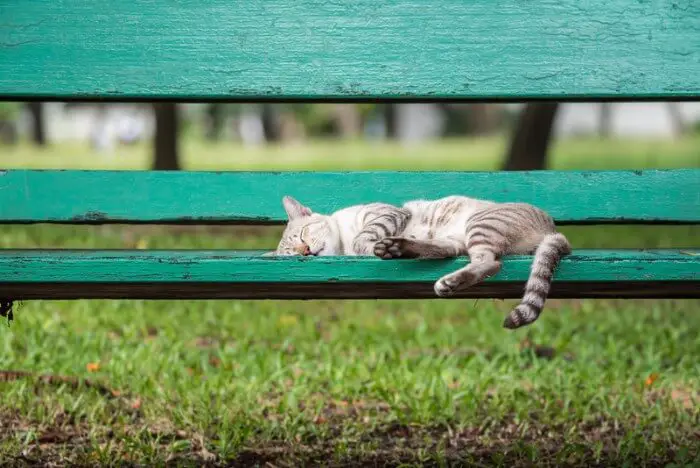Most cat lovers look at their cat as a member of their family, so the idea of being separated from them is clearly not an appealing one.
But many landlords do not accept cats due to concerns about dander, smells, fleas, and furniture damage.
Contents
Can Landlords Stop You From Having a Cat?
It depends on several different factors.
If you are willing to give up on your pet to be able to rent a room in a shared house, for example, your landlord will inadvertently make you give up your cat.
If you’re resolute on keeping your cat, you will have to look for properties where pets are allowed.

We’d also like to add that many landlords are partial to dogs but might not allow cats on their properties.
The reason for this is that cats spend a lot more time indoors compared to their canine counterparts.
As such, they also have a higher chance of damaging the furniture in their living environment.
Adult dogs, by comparison, rarely show any interest in couches or upholstered armchairs. Cats do have to sharpen their nails, which means that they might damage these areas without meaning to.
If you’ve already rented a property and your contract did not specify anything about pets, you have a legal adventure on your hands.
Your landlord cannot force you not to have a cat if this rule is not clearly noted in your contract.
Do Cats Damage Rental Property?
Unfortunately, yes.
There are some ways of preventing rental property damage, such as making sure that your cat’s nails are trimmed on a regular basis or using protective covering for the furniture.
For example, you can purchase an entire sofa cover, and some models are quite thick.
This means that your cat’s nails will not be able to puncture the material underneath.
There are also lateral scratch protectors, and most are made of thick plastic, so they will protect your furniture.

Another way in which cats can damage a rental property is by having ‘accidents’.
Naturally, unspayed and unneutered cats might spray here and there, which is why there will be a general urine smell in your room or house — one that the landlord might not appreciate.
Urine and faecal accidents can also leave stains on the carpet or upholstered furniture.
Most cats shed hair. They do this during heavy shedding periods, which happen twice a year — once before the winter and once before the summer, when they have to renew their coats.
If you know that your cat is a heavy shedder, you should take them to a groomer for a short haircut before these periods come around.
Cat hair can stick to everything, so removing it is very challenging, this can be another reason why landlords don’t accept pets.
Pros and Cons of Not Telling Landlord About Your Cat
There are not a lot of pros when it comes to hiding your cat from your landlord. Probably the only one would be that for a shorter period of time, you’ll still be able to live with your pet.
On the other hand, there are a lot of cons to not telling your landlord about your cat.
Your landlord can sue you, so you can end up having serious legal problems, especially if your contract particularly specifies that you are forbidden from having pets in your place.
You can also end up in a dilemma about what to do with your pet.

Unfortunately, many people decide to give their cats away to a friend or a rehoming centre if they have no option of moving to a pet-friendly home.
Being clear and honest from the beginning is by far the best piece of advice we can give you, as your landlord will know what to expect from yourself and the rental property.
If you tell your potential landlord about your cat right off the bat, you’ll avoid any problems in the future.
Landlords don’t react well to being lied to about pets.
Keeping your cat in mind will automatically help you make a selection of the properties you might want and can live in right from the beginning.
What Could Happen If Your Landlord Finds Out You Have a Cat
The first thing that can happen is that they can kick you out.
If your contract is clear about it and you’ve broken the rules, your landlord has the option of giving you a number of days before you are evicted.

Not all landlords are like this, though, so they can be more understanding.
You might have to be asked to install protective covers on most of the furniture, though, and that will be your own expense.

That seems like a relatively rational and normal request, on the other hand, since you are not going to have to go through the hassle of looking for a new place or deciding what to do with your cat.
How to Hide Your Cat From Landlord
Although we do not recommend trying this because you can get into serious trouble, there could be situations that call for it.
Here are some ways you can leave your landlord in the dark when it comes to owning a cat.
1. Relocate your cat for a period of time.
If your landlord usually comes to visit every month when they collect rent, for example, you know what you are supposed to do.
Being in contact with your landlord consistently will help you know just what day your cat has to be absent from your home.

If you’ve rented an entire property, chances are that the landlord might not want to check every single room, especially your private one.
If that is the case, you also have the option of keeping your cat in your room.
But the issue with this is that some cats can make noise (especially those that are quite dependent on their owners), so your plan could be ruined.
Keeping your cat elsewhere when your landlord comes around is the best way of going about things.
2. Collect your cat’s belongings
There should be no toys, litter boxes, feeding stations, cat trees, or anything else in your home that could give your landlord a clue that you are hiding a pet.
Collect all of these and make sure you inspect your place again before your landlord comes around.
3. Constantly clean your home
Pet owners often get used to the way their houses smell if they’ve had cats for a long time.
But even if these smells might be impossible to detect by your nose, they can be noticeable for other people.
Vacuum your carpets, use scented sprays and pet-friendly cleaning products for the floors, and make sure there’s no cat hair on any of the upholstered furniture.
Cat urine has a very strong smell, so make sure that you clean all of your pet’s little accidents immediately after they happen.
How To Ask Your Landlord For A Cat
Some landlords can be convinced, but we have to admit that not many of them will be swayed, especially when it comes to cats.
If your landlord is an animal lover, your chances are much better.
There are different ways of convincing your landlord. You can pay extra to keep your cat, in case things get damaged.
You can also make an agreement with your landlord where there’s a cleaning professional coming over to your place once every two weeks.
You would obviously have to pay for this service.
It’s much easier to convince a landlord to accept a pet after you’ve been in a rental property for a while and they’ve seen the way you care for your living space.
If they trust you and know you to be responsible, they might accept that you get a cat more easily.
Can Landlords Charge Extra Rent for Pets?
In the United Kingdom, landlords who allowed pets used to be able to ask for an extra deposit from their tenants to cover any potential damages on the property.
But this extra deposit has been banned, which is why landlords have no other option these days other than increasing their rent charges.
Rental properties that allow pets are usually priced higher compared to the rest, and this can be about $50/£50 per month.
In other words, you can end up paying about $600/£600 more on rent every year compared to tenants who do not have pets.
As an Amazon Associate I may earn a small fee from qualifying purchases at no extra cost to you. This helps us run the site, so thanks for your support!








Leave a Comment